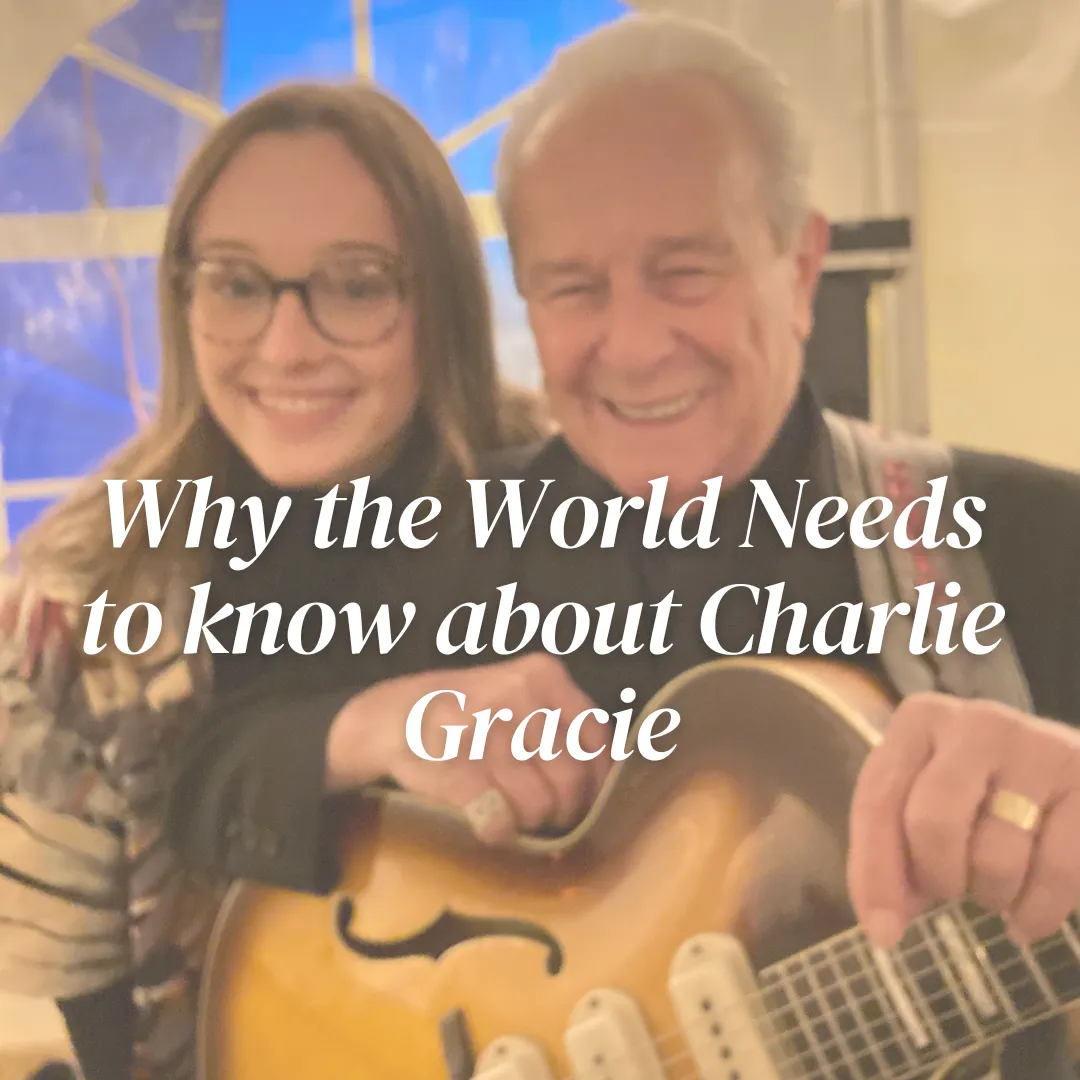


Have you ever been to the “Oldies” Capital of the World? Did you even know that it existed? Val Shively’s R&B Records has been called the “greatest record shop in the world” and has been featured in Smithsonian Magazine among others because of the over five million records which line the walls of his shop in Upper Darby, Pennsylvania. Val Shively has an extraordinary wealth of knowledge when it comes to music and, if you’re lucky enough to strike up a conversation with him, you’ll leave the store knowing far more than you did when you entered. It was Val who alerted me to Charlie Gracie, the artist who changed the course of Rock and Roll, inspired some of the most iconic musicians of the twentieth century, and left a lasting legacy both in music and as an individual.
I was thirteen when I first met Charlie Gracie. Val had given me his address after realizing that my family was neighbors with the Gracie’s. He told me to simply knock on their door and ask for an autograph. While this is never something that you could do to most celebrities, Charlie gracefully (pun intended) signed my copy of his hit record and stood outside chatting with my dad and me for about an hour. He was incredibly kind and humble, and invited us to his next performance. Until Val alerted me, I was completely unaware that I was living a few streets down from a Rock and Roll star. His story is a fascinating one, and it deserves to be heard and applauded by Rock and Roll fans around the world.
Charlie Gracie was born in South Philadelphia and began playing guitar at the age of ten. Charlie began recording his own music at age 15 in 1951, before many of his peers and other Rock and Roll stars. He first appeared at 16 on the Paul Whiteman television show and then began playing for events, contests, and on the radio. Charlie signed his first official record contract with Cadillac Records under Graham Price and, after releasing a few singles, appeared on American Bandstand. Gracie then switched to 20th Century Records and then Cameo Records. It was then in 1956 that he released his two most popular hits, Butterfly and Fabulous. Butterfly reached #1 in jukebox plays in the Billboard chart and sold over 2 million copies. It was then that Charlie topped the charts in both the States and the UK, establishing himself as a rockabilly star who had talent to share. He played at some of the largest venues in the United States and became the second American of his genre to tour the UK. Charlie had even more fame in the UK than he did in the US, which he earned by playing at some of London’s largest performance venues as well as many others throughout the United Kingdom. It was also then that he began inspiring other artists, creating not only his own legacy in music but influencing the legacies of other musicians as well.
While this is the general history of Charlie’s rise to fame, he seemed to drop off the map shortly after this. This does not objectively make sense because he released billboard-topping singles, went on two tours of the UK, performed at impressive venues around the United States, and had a large presence in radio and TV. However, there is one part of Charlie’s story which is not widely publicized. The Bandstand host Dick Clark failed to pay Charlie his royalties and, as a result, Charlie pursued legal action against Clark and Bandstand. Although Charlie was awarded the royalties that he earned, Dick Clark blacklisted Charlie and prevented his music from garnering the fame it deserves. Charlie, an honest and hard-working musician, had his career offset because of greed and dishonesty in the music industry.
When Val told me this part of Charlie’s story, I was shocked. Charlie Gracie was set to have fame like the classic stars we know today. He released music alongside Elvis, before Buddy Holly, and certainly before most of the other Rockabillies whose names are forever ingrained into the public perception of Rock and Roll. I imagined that Charlie would be resentful and bitter, as many would. However, he only brought it up in passing when telling me about his career. He wasn’t angry, but instead said that he was grateful to have been able to pursue music throughout his entire life.
Despite the setback with Dick Clark and Bandstand, Charlie never stopped performing. He maintained a faithful following in the UK and around Europe, reflecting that “I still enjoy what I do, I love to sing and play… I played Ireland, I played England, I played Scotland, I played Wales…I play Italy, France, Germany, Belgium, Holland, Finland, people are people! Most people are nice” in reference to the multitudes of fans which have come to see him perform around Europe and the United States. Charlie continued to write music as well, and released both singles and albums throughout his career which can be found on Spotify and other streaming services. Charlie also stayed in the Philadelphia area, and I was lucky enough to attend some of his many local performances. Unfortunately, Charlie contracted Covid 19 in the spring of 2022 and passed away from complications related to the virus on December 16th, 2022 at 86 years old. Just like the title of his 2018 single Can’t Stop Rock’n, Charlie continued to perform music from just 10 years old until his passing at 86. Charlie has been credited as an inspiration by many artists including Paul McCartney, George Harrison, and Graham Nash. I’ll never forget when Charlie casually mentioned how, on his 80th birthday, Paul McCartney sent a video sharing his disappointment at missing Charlie’s birthday party.
Charlie Gracie left a lasting legacy both with music and as a person. I was honored to sing at Charlie’s funeral, and helped his son Charlie Jr. pick out the music. Both from my conversations with Charlie Jr. and from his eulogy, it is clear how much Charlie Gracie valued his fans and all people. In his eulogy, Charlie Jr. recounts stories of countless people who told him how they ran into his father at the grocery store or a local restaurant and had long conversations with him. His humility and kindness are remembered by many, as he was truly a man of the people. In a 2019 interview with Marty Wilde, Charlie recounts that his time spent performing on the Paul Whiteman Show helped him buy his family their first refrigerator. He grew up in a South Philadelphia row home with no bathroom, toilet, or hot water, and was grateful that his music allowed his family to live more comfortably. In the same interview, Charlie reflects that “I never got rich. But I come from a poor working class family” and “I get up every morning - I say ‘let’s Rock and Roll.’ That’s what I do. I have to pay the bills.” Charlie Gracie’s realistic approach to music allowed him to make a living out of his passion while staying grounded and connecting with fans. He worked with other stars such as Chuck Berry, Little Richard, Gerry Lee Lewis, the Everyly Brothers, Eddie Cochran, Brenda Lee, and Chubby Checker among others. In performances with multiple artists, he was remembered for sitting in the audiences among fans to watch the other musicians perform. Charlie has said “I believe in destiny. My life has already been picked out for me, it’s a question of me filling in the void and I’ve done it the best I could. Now I don’t know how much time I’ve got left, might be a month, might be a year, I might live to be 93 like Tony Bennett. And if I could still walk without a walker I’d still sing and play the guitar.”

Pictured: Charlie Gracie with author (Christina Schwab) at a concert at Pepper’s in King of Prussia, PA on March 14th, 2021.
Although Charlie passed almost a year and a half ago, his legacy continues to live on in the music industry. The Rock & Roll Hall of Fame recently put on a new display entitled “Rave On” which featured Charlie Gracie’s Guild guitar, the one he played throughout his entire career. The exhibit “pays tribute to the pioneers who created the sound and style of rock and roll,” so it is only fitting that “Rock & Roll’s Hidden Giant” should have a prominent feature. Charlie Gracie has yet to be inducted into the Rock and Roll Hall of Fame, but his important impact on the music industry deserves to be congratulated there. He also wrote an autobiography, Rock & Roll’s Hidden Giant: The Story of Rock Pioneer Charlie Gracie, which tells his story through his own perspective. He has left a legacy both of Rock and Roll and humility because he was an inspiring musician, role model, and neighbor.
Charlie Jr. quotes his father, saying that “Paul McCartney may like me and all these big stars may like me and they all think that I influenced them which is great, but the bottom line is I’m still little Charlie Gracie who came from South Philadelphia. I sing and play the guitar. And if you came to see me for a couple of hours at some venue and you enjoyed yourself and it made you forget about your problems for a while then I fulfilled my mission in this life and I’m eternally grateful to God for that.” This is Charlie’s legacy, and the world should know about it.
Email: christina@christinalschwab.com
Site: www.christinalschwab.com
